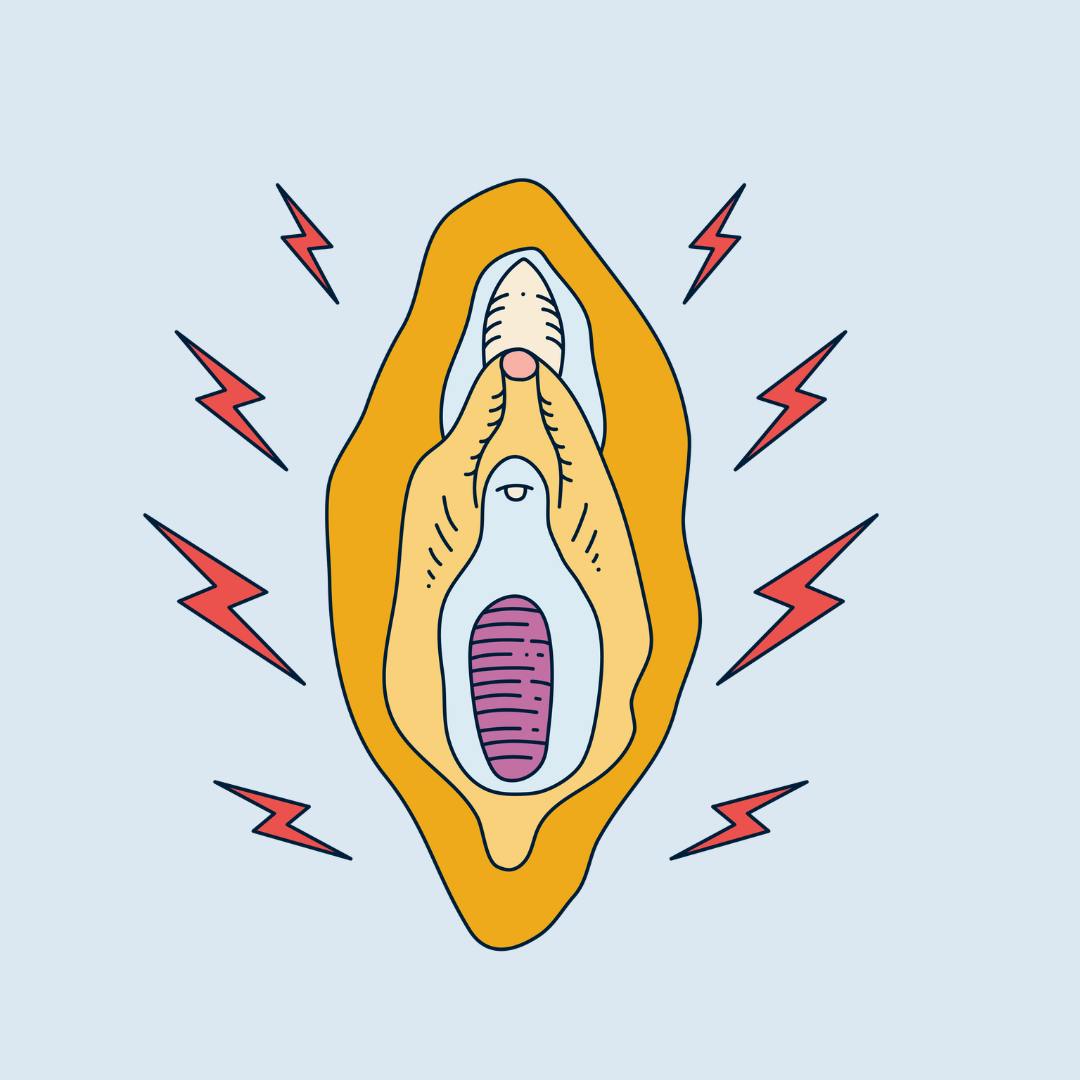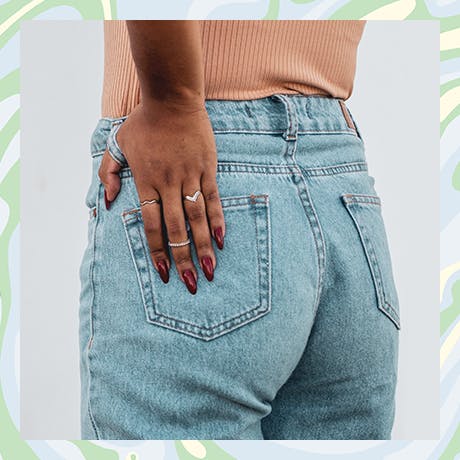‘Worse things happen’; but when it feels like ten mosquitoes have chomped their way all over the opening of your vagina, creating itchy welts that can only be soothed by scratching at them until your nail varnish chips off and you’ve drawn out sticky, tangy blood; they really, really don’t.
Your basket
Your basket is currently empty.


£-1.00
£-1.00

£-1.00
What is the cause of my vaginal itching?
Share

What is the cause of my vaginal itching?
Vaginal itching is one of those conditions where it’s not ‘the end of the world’; except it really is.

Illustration by
Sabrina Bezerra and Erin Rommel
Date
4th October 2022
‘Why does my vagina itch’ and ‘how to stop vaginal itching’ are questions typed into google by too many people with vaginas; because vaginal itching is truly one of the greatest curses of possessing a vagina in the first place.
You can’t take ibuprofen for itching, and you can’t soothe it with a heating pad. You just have to squirm and shift and swear, while googling the answers to questions you really, really don’t want to have to ask anyone in person.
“Typically, when we discuss vaginal itching, we are referring to itching of the vulva, perineum, introitus and anus,” says Dr. Betsey Greenleaf DO, FACOOG, CEO of The Pelvic Floor Store. “In English and not medical speak, it is external itching of the groin, the opening of the vagina, lips of the vulva, the space between the vagina and anus and the butthole.
“Because of the nerve endings, most itching is felt externally,” Greenleaf continues. “Itching internally is not typically a complaint, even with an infection. More often than not, internal irritation creates a crampy sensation, usually referring to discomfort in the belly button region.”

When it comes to vaginal itching causes: well, there are plenty.
Internal and external vaginal itching have different etiologies and treatments,” says Monte Swarup MD, FACOG, founder of HPD Rx. “Internal most commonly is a yeast infection but can also be vaginal atrophy from lack of estrogen. External itching most commonly would be a skin yeast infection. However, external itching can also be associated with rare vulval dysplasias or even cancers.”
Kecia Gaither MD, Director of Perinatal Services/Maternal Fetal Medicine at NYC Health and Hospitals/Lincoln in the Bronx, posits causes such as: “Dermatological conditions like psoriasis or eczema; bacterial vaginosis, [which is a] bacterial overgrowth again caused by alterations in the microbiome; sexually transmitted infection, like genital warts, trichomaniasis, herpes; [and] pubic lice.”
Gaither also agrees with Swarup that postmenopausal changes resulting in a drop in estrogen and subsequent vaginal thinning and dryness could be to blame; as could – rarely – vulvar cancer, which would require lesions to be biopsied for a diagnosis.
Greenleaf adds to this pretty inexhaustive-sounding list of vaginal itching causes by suggesting irritants including allergies – “food and seasonal allergies can affect mucosal membranes leading to inflammation and itching” –; and inflammatory conditions. “autoimmune illness can cause skin conditions that lead to itching, such as diseases like lichen sclerosis,” she explains.
“
Any itching, particularly if lesions [or] skin changes are present, should warrant a visit to the gynaecologist – embarrassment to be thrown out the window,
So there are a fair few vaginal itching causes; but there are also a vast number of possible treatments when it comes to how to stop vaginal itching.
And it starts with the most obvious-yet-nerveracking option: see a healthcare professional.
“Any itching, particularly if lesions [or] skin changes are present, should warrant a visit to the gynaecologist – embarrassment to be thrown out the window,” says Gaither, firmly. And Greenleaf agrees. “Ideally, infections should be diagnosed by a healthcare practitioner,” she says. “They can be treated with antifungal or antibiotic creams placed in or on the vagina and vulva, or by oral medications.
“When itching disrupts one’s life, use an over-the-counter Benadryl cream (not gel, because the gel contains alcohol; that stings), or a soothing oil,” Greenleaf continues. “Sometimes doctors prescribe hydrocortisone cream, but this should be used for short periods because steroid creams can further weaken the tissue and cause further irritation.”
Essentially, your healthcare provider needs to rule out potential vaginal itching causes. “Allergic conditions need to be evaluated by an allergist ideally; [and] sometimes taking antihistamines can help with seasonal allergies and vulvar itching” says Greenleaf; and your doctor may be able to draw your attention to certain causes you may not have realised could have such an effect on your vagina. “Around Janurary, I often see this type of itching from patients that have started their New Year’s Resolutions,” Greenleaf continues. “They try to eat healthily, but overdo it on kale and spinach, which are high in oxalates: chemicals within certain vegetables that can build up within the tissue and cause irritation.”

It’s also worth considering Daye’s non-invasive Vaginal Microbiome Screening (VMS), which will detect an imbalance in the vaginal microbiome in a non-invasive, accessible way from the comfort of your own home. It sounds like a miracle, but it’s a simple process: return one of your used (that part’s crucial) Daye tampons back, and Daye’s lab will do an analysis of your vaginal microbiome. If you’re unsure what’s causing your vaginal itching, there’s a chance an imbalance in vaginal microbiome (resulting in, for example, thrush or bacterial vaginosis) could be to blame; and if that’s the case, your online results (together with a range of aftercare options) will let you know.
And, of course, answers to ‘how to stop vaginal itching’ can be found at home or in your local pharmacy, too. “Yeast infections are easily treated with over-the-counter or online creams, suppositories or prescription one-dose pills,” says Swarup. “[They] can be prevented by changing out of wet clothes quickly and taking certain preventative vaginal probiotics.”
“Stay away from feminine deodorants and sprays that cover up odour,” instructs Greenleaf.
“Wash with mild soap, or preferably just water. If feeling inflamed, try using an ice pack for no more than 20 minutes. Sleep in loose clothing or no clothes below to let things ‘air out’.”
But, ultimately – and it can’t be said enough – if you’re at all concerned, seek professional advice. “Don’t rely on Dr. Google,” says Greenleaf. “It is easy to search the internet from the privacy of your own home; however, there is [a lot of] misinformation. You can spend a lot of money and time trying to treat it yourself; [but you can] end your worrying by having it evaluated and treated the right way by a healthcare professional.”
